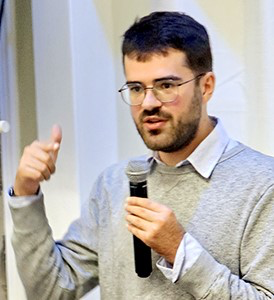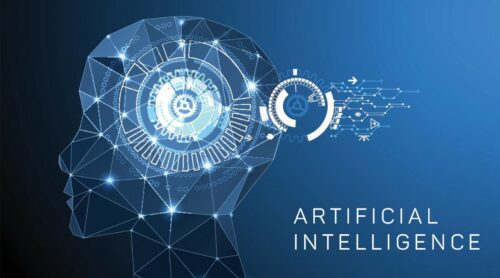
- This event has passed.
Alex Olson – Senior Research Associate at the UofT’s Centre for Analytics and AI Engineering

Alex Olson – Senior Research Associate at the UofT’s Centre for Analytics and AI Engineering helps lift mystery surrounding world of AI
Don Walker introduced his grandson Alex Olson who is a Senior Research Associate at the U of T’s Centre for Analytics and AI Engineering. Alex’s topic was titled “Ever wondered how Siri, Alexa, or Google Assistant seem to understand you?”
Alex, a graduate of the University of Edinburgh, was able in reasonable layman’s terms to demystify the technology behind intelligent chatbots like ChatGPT. He compared traditional computer programs that know the characteristics of their inputs to AI programs that accept inputs that don’t conform to a set of rules. An example is languages and sentences, it could be anything. Early AI software used a set of prewritten rules to make decisions and solve problems such as the program to recognize faces from cameras that began in the 1990’s.
 A newer generation of AI is based on machine learning where large numbers of examples or data is entered and the program imitates the way humans learn and gets better at producing a result. Alex explained that machine learning is similar to how babies learn through negative or positive feedback. He spoke about Artificial Neural Networks that teach computers to process data in a way that is inspired by the human brain. The neurons learn to watch out for specific things that can then be used to make predictions. But Alex added that neuron networks are not brains. Once a neuron network is trained, it doesn’t keep learning. It is a type of machine learning process, called deep learning, that uses interconnected nodes or neurons (complex mathematical equations) in a layered structure that resembles the human brain.
A newer generation of AI is based on machine learning where large numbers of examples or data is entered and the program imitates the way humans learn and gets better at producing a result. Alex explained that machine learning is similar to how babies learn through negative or positive feedback. He spoke about Artificial Neural Networks that teach computers to process data in a way that is inspired by the human brain. The neurons learn to watch out for specific things that can then be used to make predictions. But Alex added that neuron networks are not brains. Once a neuron network is trained, it doesn’t keep learning. It is a type of machine learning process, called deep learning, that uses interconnected nodes or neurons (complex mathematical equations) in a layered structure that resembles the human brain.
This is the basis of new language models such at ChatGPT. The new Apple iPhone runs neural networks directly on the phone using special processors from Nividia (accounting for its surge in value over the years).
AI is producing benefits such as data analysis of a large number of surgeries to guide decision making on present day surgeries. Also, governments and companies are catching up to using AI to give insight into past performance when developing regulations and business strategies.
Alex said that many people express deep concern about the future of AI around such things as job displacement, concentration of power and societal impact. He however remains optimistic that neural networks are tools that can be used for positive applications. He concluded by saying that AI is a tool we need to understand and guide responsibly.
There were many questions for Alex on manipulation of photos and videos, medical assistance and self driving cars. Alex gave an example of eyeglasses available today that have cameras and software that can guide a sight-challenged wearer to the location of an item.
Duncan McLaren thanked Alex for his informative presentation of a very complex topic that our
members could well understand.

